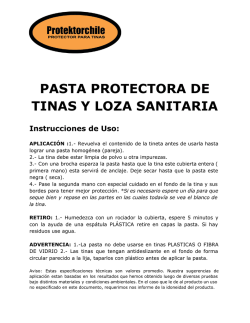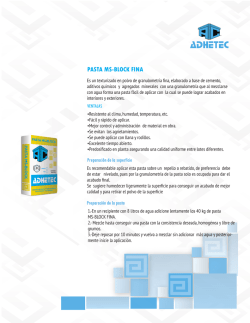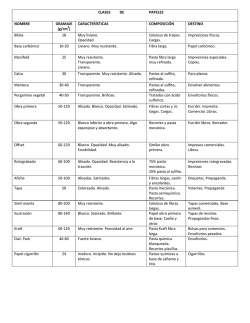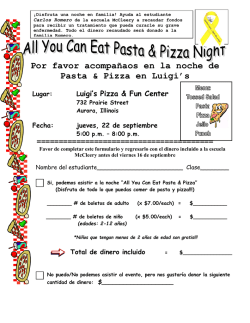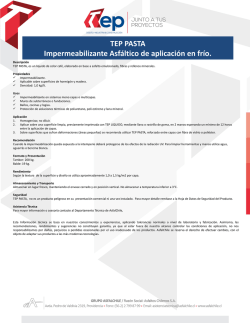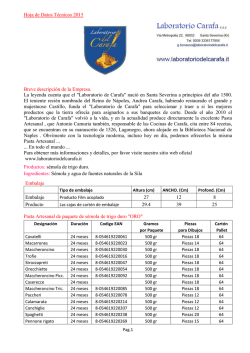
Pasta Roller and Cutter Set PRS-50
INSTRUCTION BOOKLET AND RECIPES Pasta Roller and Cutter Set PRS-50 For your safety and continued enjoyment of this product, always read the Instruction Book carefully before using. CONTENTS 5. The use of attachments not recommended or sold by Cuisinart may cause fire, electric shock or injury. Important Safeguards.................... 2 Unpacking Instructions.................. 3 Parts and Features ........................ 4 6. Do not use more than one attachment at a time. Attaching Roller or Cutter to Stand Mixer .................................... 5 7. Do not use the stand mixer or attachment if it is damaged or if the cord is damaged. Have it checked and serviced before resuming use. Rolling Pasta Sheets...................... 5 Making Fettuccine or Spaghetti .... 6 Tips and Hints .............................. .6 Cleaning and Maintenance ............ 7 8. Do not use this attachment for anything other than its intended use. Recipes ......................................... 7 IMPORTANT SAFEGUARDS 9. Do not use outdoors. 10. To protect against the risk of electric shock, do not put the power unit in water or other liquids. When using electrical appliances, basic safety precautions should always be taken, including the following: 11. Do not let cord hang over edge of table or counter. 12. Never leave your pasta maker attachments unattended while the stand mixer is running. 1. READ ALL INSTRUCTIONS BEFORE USING. 13. The attachments are intended for use with the basic appliance SM-50. 2. Turn off and unplug the Cuisinart® Stand Mixer before fitting or removing the Pasta Roller or Cutter Attachments, after use and before cleaning. 14. Do not operate your appliance in an appliance garage or under a wall cabinet. When storing in an appliance garage always unplug the unit from the electrical outlet. Not doing so could create a risk of fire, especially if the appliance touches the walls of the garage or the door touches the unit as it closes. 3. Close supervision is necessary when any appliance is used by or near children or individuals with certain disabilities. Cuisinart does not recommend the use of this appliance by children. 4. Avoid contact with moving parts and fitted attachments. To reduce the chances of bodily injury and/or damage to the stand mixer or pasta maker attachments, keep hands, clothing, cooking utensils, etc., away from the moving parts during operation. 2 SAVE THESE INSTRUCTIONS FOR HOUSEHOLD USE ONLY UNPACKING INSTRUCTIONS 1. Place the gift box containing your Cuisinart® Pasta Roller and Cutter Set on a flat sturdy surface before unpacking. 2. Lift the corrugated insert out of the gift box. Remove the body, Pasta Roller, Fettuccine Cutter and Spaghetti Cutter. To assemble the pasta maker attachments, follow instructions on page 5. Replace all packaging materials inside box and save the box for repackaging. Before using for the first time: Wipe all parts according to Cleaning and Maintenance on page 7. Do not immerse or run under water. WARNING: RISK OF FIRE OR ELECTRIC SHOCK The lightning flash with arrowhead symbol within an equilateral triangle is intended to alert the user to the presence of uninsulated, dangerous voltage within the product’s enclosure that may be of sufficient magnitude to constitute a risk of fire or electric shock to persons. The exclamation point within an equilateral triangle is intended to alert the user to the presence of important operating and maintenance (servicing) instructions in the literature accompanying the appliance. 3 PARTS AND FEATURES 1. Pasta Sheet Roller Rolls pasta dough into sheets to make lasagna or hand-cut pasta, and to use with pasta cutters. The Thickness Adjuster Knob, located on the lift, Adjusts rollers to create thicker or thinner pasta sheets. 2. Fettuccine Cutter Cuts pasta sheets into perfect strands for fettuccine. 3. Spaghetti Cutter Cuts pasta sheets into this all-time favorite pasta. 4 Attaching Roller or Cutter to Stand Mixer 4. Flatten one piece of dough into a disk about ¼ inch thick. Set the stand mixer to Speed 3 or 4. Pass the disc through the roller about 3 times to begin kneading. Fold the disk in half, left to right, and pass it through the roller again, fold side first. Then, fold the sheet in half again, left to right, and rotate it 90 degrees; pass it through the roller again. Repeat these two steps 10 to 15 times until pasta starts to feel silky and smooth. TIP: If the pasta starts to stick to the roller, lightly dust the rolled pasta sheet with “00” flour. Do not dust roller. 1. Make sure the stand mixer is unplugged. 2. Gently pull port cover off front of mixer head to remove. 3. Turn attachment knob counterclockwise until outlet opening is unobstructed. 4. Insert the pasta roller or one of the cutters into the opening with the small round post slightly below the notch on right side of opening. 5. Once the pasta sheet is silky smooth and pliable, use the knob to set the pasta roller to Setting 7 and pass the pasta sheet through twice. Do not fold. Repeat this step on Settings 6 and 5. If the pasta sheet becomes long and tricky to work with, cut the sheet in thirds with a sharp knife. 5. Turn attachment back and forth slightly until the knob slips into the notch and attachment locks into place. 6. Turn the knob clockwise to firmly secure to mixer. OPERATION 2. After dough has rested and is ready to roll, set roller to Setting 8. 6. Continue rolling each sheet on the remaining settings to achieve desired thickness. Recommended settings are 3 for fettuccine, 2 for spaghetti, hand-cut pappardelle or lasagna, 1 for filled pastas like ravioli and tortellini. 3. Cut the dough into four pieces, about 4 to 5 ounces each. Cover dough with plastic wrap or a damp paper towel so it doesn’t dry out. 7. As pasta sheets are rolled out, store on a baking sheet, generously dusting the sheet and each layer with semolina flour. Repeat with remaining 4- to 5- ounce pieces. Rolling Pasta Sheets: 1. Prepare pasta dough as directed by recipe. 5 Making Fettuccine or Spaghetti pasta-making process. 2. Turn mixer to Speed 4 and slowly insert the dusted pasta sheet. • The humidity of the day can greatly affect the pasta dough. If the day is very humid, watch and feel the dough when you are finished kneading. If it is still sticky, knead in one tablespoon of flour at a time until the stickiness disappears. 3. Separate strands of fettuccine or spaghetti as soon as they are cut and place on a tray dusted with semolina flour to prevent sticking. Dust cut pasta with more semolina flour to prevent sticking; excess will fall off during cooking. • When making fettuccini or spaghetti, separate pasta as soon as it is cut from the pasta maker. Toss freshly cut pasta with semolina flour to prevent sticking. Pile semolina-dusted noodles together in loose bundles on a flat, clean surface. 4. Cook immediately or store in plastic bags and keep refrigerated for up to 3 days. • Fresh pasta is best if cooked immediately. If storing, place fresh pasta dough or noodles in plastic bags and keep refrigerated for up to 3 days. Fresh pasta dries very quickly and becomes fragile easily. 1. Attach the desired pasta cutter to the stand mixer as instructed previously. NOTE: After you finish rolling out sheets or making fettuccine or spaghetti, remove attachment, tighten attachment knob, then replace port cover on your stand mixer. • To cook pasta, generously salt 6 quarts of boiling water. Add pasta slowly and separately; make sure no pasta is sticking together before adding to water. Cook until tender, about 3 to 8 minutes, based on the shape and thickness of the pasta. Stir pasta and drain in colander. Tips and Hints • When measuring ingredients to prepare the pasta dough, it is essential to stir the flour before you measure it. Do not scoop it right out of the bag. • The key to making fresh pasta is to have the right feel of the dough. It is important that the dough is not too moist or too dry. The dough should be pliable and come together in one ball yet should not be sticky to the touch. • The stand mixer should rest at least one hour after processing 2 consecutive pasta dough recipes. • It may be necessary to experiment with the fresh egg pasta recipe a few times to get the feel of the dough and the 6 CLEANING AND MAINTENANCE tively, if it is too wet, add the “00” flour one tablespoon at a time to desired consistency. Keep in mind, this dough won’t resemble a smooth ball, it will only just come together in large chunks with some possible smaller bits to knead in by hand. Should any flour or loose dry bits be left behind at the bottom of the bowl, leave them there and do not incorporate into final dough. 1. Remove the pasta roller or cutter from stand mixer. 2. Allow any residual dough on the attachment to dry before removing it with a small, firmbristle brush. NOTE: Pasta roller and cutters must be kept dry. Do not immerse in water, or spray with water, on any part of the attachments. 3. Transfer dough to a lightly floured surface and knead all dough together into a ball by hand until smooth and it springs back to the touch, about 2 minutes. Any other servicing should be performed by an authorized service representative. Pasta Dough 4. Wrap in plastic wrap and let rest at least 20 minutes before using. Pasta dough can be made and stored in the refrigerator for up to 3 days. The combination of “00” flour and semolina gives this dough the perfect bite when cooked, compared to traditional pasta dough made with just “00” flour. 5. To roll, follow instructions on page 5. Makes about 1½ pounds of dough, enough for 8 servings 5 2½ 2 ⁄3 Nutritional analysis per serving (3 ounces): Calories 218 (15% from fat) • carb. 35g • pro. 10g • fat 4g • sat. fat 1g • chol. 134mg • sod. 41mg • calc. 13mg • fiber 3g large eggs cups “00” flour cup semolina flour 1. Put all of the ingredients, in the order listed, into the Cuisinart® mixing bowl. Attach the dough hook and mix on Speed 4 to combine. 2. Allow to mix until dough mostly comes together, about 4 to 6 minutes. At about 5 minutes of mixing, check the texture. If it is too dry, add water one tablespoon at a time; alterna7 MANUAL DE INSTRUCCIONES Y RECETAS Aditamento rodillo/cortador de pasta PRS-50 Para su seguridad y para disfrutar plenamente de este producto, siempre lea cuidadosamente las instrucciones antes de usarlo. ÍNDICE durante el funcionamiento. Medidas de seguridad importantes ................... 2 5. El uso de accesorios/ aditamentos no recomendados o vendidos por Cuisinart presenta un riesgo de incendio, electrocución o heridas. Instrucciones de desembalaje....... 3 Piezas y características .................. 4 Conexión a la batidora de pie ........ 5 6. No use más de un aditamento a la vez. Cómo hacer hojas de pasta ........... 5 Cómo hacer fetuchinis o espaguetis................... 6 7. No utilice el aparato ni el aditamento si estuvieran dañados o si el cable estuviera dañado; regréselos a un centro de servicio autorizado para que los revisen y los reparen. Consejos y sugerencias ................. 6 Limpieza y mantenimiento ............ 7 Recetas ......................................... 7 8. No utilice este aditamento para ningún otro fin que no sea el indicado. MEDIDAS DE SEGURIDAD IMPORTANTES 10. Para reducir el riesgo de electrocución, no coloque la base del aparato en agua u otro líquido. Al usar aparatos eléctricos, siempre debe tomar precauciones básicas de seguridad, incluso las siguientes: 11. No permita que el cable cuelgue del borde de la mesa o de la encimera. 1. LEA TODAS LAS INSTRUCCIONES ANTES DE USARLO. 12. Nunca descuide ni abandone el aditamento mientras la batidora de mano está funcionando. 2. Apague y desconecte la batidora de pie Cuisinart® antes de instalar/retirar el aditamento, después del uso y antes de la limpieza. 13. Este accesorio ha sido diseñado para ser usado con la batidora de pie Cuisinart SM-50. 9. No lo utilice en exteriores. 14. No haga funcionar el aparato bajo o adentro de un armario. Siempre desconecte el aparato antes de guardarlo en un armario.Dejar el aparato conectado presenta un riesgo de incendio, especialmente si éste toca las paredes o la puerta del armario cuando cierra. 3. Supervise el uso de este aparato cuidadosamente cuando sea usado por o cerca de niños o personas con ciertas discapacidades. Cuisinart no recomienda que los niños usen este aparato. 4. Evite el contacto con las piezas móviles y los accesorios/ aditamentos. Para evitar el riesgo de heridas y/o daños al aparato o al aditamento, mantenga las manos, el cabello, la ropa y los utensilios alejados de las piezas móviles 2 GUARDE ESTAS INSTRUCCIONES PARA USO DOMÉSTICO SOLAMENTE INSTRUCCIONES DE DESEMBALAJE 1. Ponga la caja sobre una superficie espaciosa, plana y segura. 2. Retire el inserto de cartón de la caja. Retire el cuerpo, el rodillo para pasta, el cortador de fetuchinis y el cortador de espaguetis. Para ensamblar el aditamento, siga las instrucciones de ensamblaje que se encuentran en la página 5. Le aconsejamos que conserve el material de embalaje. Antes del primer uso: Limpie todas las piezas, según se describe en la sección “Limpieza y Mantenimiento” en la página 7. No sumerja ni enjuague ninguna de las piezas en agua. ADVERTENCIA: RIESGO DE INCENDIO O ELECTROCUCIÓN El símbolo representado por un relámpago con punta de flecha dentro de un triángulo equilátero tiene como fin alertar al usuario de la presencia de voltajes peligrosos no aislados en el interior del aparato, los cuales pueden ser de suficiente magnitud para constituir un riesgo de incendio o electrocución. El signo de exclamación dentro de un triángulo equilátero tiene como fin alertar al usuario de la presencia de instrucciones importantes de operación y mantenimiento (servicio) en la documentación que acompaña al equipo. 3 PIEZAS Y CARACTERÍSTICAS 1. Rodillo de pasta Estira la masa de pasta, formando hojas de pasta para hacer lasañas o pasta cortada a mano. Perilla de ajuste del grosor Ajusta la altura de los rodillos para crear hojas de pasta más gruesas o más delgadas. 2. Cortador de fetuchini Corta las hojas de pasta en pastas largas y anchas. 3. Cortador de espaguetis Corta las hojas de pasta en pastas largas y delgadas. 4 Conexión a la batidora de pie seque. 4. Formar un disco de aproximadamente ¼ pulgada (0.5 cm) de espesor con cada porción. Encienda la batidora a velocidad 3 o 4. Introduzca la masa en el rodillo y estírela aproximadamente 3 veces para empezar a ablandarla. Doble el disco a la mitad, de la derecha a la izquierda, e introdúzcalo en el rodillo otra vez, la lado doblado primero. Doble el disco a la mitad otra vez, de la izquierda a la derecha, gírelo 90 grados e introdúzcalo en el rodillo de nuevo. Repita estos pasos 10–15 veces, hasta obtener una hoja de pasta suave y sedosa. CONSEJO: si la pasta empieza a pegar al rodillo, espolvoréela levemente con harina “00”. No espolvoree el rodillo. 1. Asegúrese de que la batidora esté desconectada. 2. Quite suavemente la tapa del receptáculo para aditamentos. 3. Afloje la perilla para aditamentos, girando en sentido antihorario hasta que el puerto de conexión se abra. 4. Introduzca el eje del rodillo o del cortador en el puerto de conexión. 5. Gire ligeramente el aditamento hacia adelante y atrás de manera que la clavija en el eje del aditamento encaje en la ranura del receptáculo. 6. Apriete la perilla para aditamentos, girando en sentido horario, para sujetar el aditamento a la batidora. 5. Cuando la hoja de pasta esté muy suave y flexible, ajuste el rodillo al nivel 7 y estire la hoja dos veces más, sin doblarla. Repita este paso, ajustando el rodillo al nivel 6, y luego al nivel 5. Si la hoja de pasta se vuelve demasiado difícil de manejar, afilado. OPERACIÓN Cómo hacer hojas de pasta: 1. Prepare la masa de pasta según la receta. 6. Siga estirando cada hoja hasta obtener el espesor deseado. Utilice el nivel 3 para los fetuchinis, el nivel 2 para los espaguetis, las pappardelle o las lasañas, el nivel 1 para las pastas rellenas tales como los ravioles, como los tortellini. 2. Después de que la masa haya descansado, ajuste el rodillo al nivel 8. 3. Divida la masa en porciones de 4–5 onzas (115–140 g). Cubra la masa con papel film/plástico o una toalla húmeda para evitar que se 5 Es importante que la masa no sea demasiado húmeda ni demasiado seca. Debe estar flexible y formar una bola de masa, pero no pegajosa al tacto. 7. Ponga las hojas de pasta sobre placas para hornear generosamente espolvoreadas con sémola y espolvoréelas también. Repita con las demás porciones. • Puede que necesite experimentar varias veces con las recetas de pasta de huevo hasta conseguir la consistencia requerida. Cómo hacer fetuchinis o espaguetis • La humedad del aire puede afectar significativamente la masa. Si el día es muy húmedo, averigüe la consistencia de la masa inmediatamente después de amasarla. Si la masa está pegajosa, agregue harina, 1 cuchara a la vez, y siga amasando hasta que esté suave. 1. Conecte el cortador de pasta deseado a la batidora, según se indicó anteriormente. 2. Encienda la batidora a velocidad 4 e introduzca lentamente la hoja de pasta en el rodillo cortador. 3. Separe inmediatamente las pastas y colóquelas sobre una bandeja espolvoreada con sémola. Espolvoree las pastas cortadas con más sémola para evitar que peguen. Nota: el exceso de sémola se caerá durante la cocción. • Cuando haga fetuchinis o espaguetis, separe las pastas inmediatamente después de cortarlas y espolvoréelas con sémola para evitar que peguen. Haga pilas sueltas de pastas espolvoreadas sobre una superficie plana y limpia. 4. Cocinar inmediatamente o conservar en el refrigerador durante hasta 3 días, en bolsas herméticas. • La pasta fresca es mejor si se cocina inmediatamente, pero se conservará en el refrigerador durante hasta 3 días, en bolsas herméticas. Tenga presente que la pasta fresca se seca y se pone frágil muy rápido. NOTA: después de terminar, retire el aditamento de la batidora, cierre la cubierta del puerto de conexión. Consejos y sugerencias • Cuando prepare pasta fresca, siempre revuelva la harina antes de medirla. No mida la harina directamente al salir del paquete. • Para cocer la pasta, caliente agua salada en una olla grande. Agregue las pastas lentamente y por separado, cerciorándose de que no estén pegadas antes de introducirlas en el agua. Cocínelas por • El secreto de la pasta fresca es la consistencia de la masa. 6 gancho amasador y mezclar a velocidad 4. 3–8 minutos, dependiendo de la forma y del espesor de las pastas, hasta que estén tiernas. Revuelva y escurra la pasta con un colador. 2. Amasar por 4–6 minutos, hasta formarse una masa. Averiguar la textura de la masa después de 5 minutos. Si la masa está demasiado seca, agregar agua, una cucharada a la vez, hasta conseguir la consistencia deseada. Si está demasiado húmeda, agregar harina “00”, una cucharada a la vez, hasta conseguir la consistencia deseada. Tener presente que la masa no formará una bolsa suave, sino pedazos grandes con pedacitos más pequeños que deberá amasar a mano. Si queda harina o pedacitos secos de masa en el fondo del bol, no incorporarlos a la masa. • Permita que la batidora descanse por una o más hora antes de procesar tandas consecutivas. LIMPIEZA Y MANTENIMIENTO 1. Retire el aditamento de la batidora. 2. Permita que los residuos de masa se sequen, y luego quítelos con un pequeño cepillo de cerdas firmes. NOTA: debe mantener el rodillo y los cortadores secos. No sumerja, rocíe con agua ni moje (incluso con un paño húmedo) ninguna parte de los aditamentos. 3. Colocar la masa sobre una superficie ligeramente enharinada y seguir amasando a mano por aproximadamente 2 minutos, hasta que esté suave y elástica. Cualquier otro servicio debe ser realizado por un técnico autorizado. 4. Envolver en papel film/ plástico y dejar descansar por 20 minutos o más antes de usar. O poner en un recipiente hermético y refrigerar por hasta 3 días. Pasta básica La combinación de harina “00” y de sémola da a la pasta cocida la consistencia perfecta. Rinde 1½ libra (685 g); 8 porciones 5. Para estirar, seguir las instrucciones de la página 5. tInformación nutricional por porción de 5 2½ huevos grandes tazas (310 g) de harina “00” 2 /3 taza (110 g) de sémola 1. Colocar todos los ingredientes en el bol de la batidora, en el orden indicado. Instalar el 3 onzas (85 g): Calorías 218 (15 % de grasa) • Carbohidratos 35 g • Proteínas 10 g • Grasa 4 g • Grasa saturada 1 g • Colesterol 134 mg • Sodio 41 mg • Calcio 13 mg • Fibra 3 g 7
© Copyright 2026
